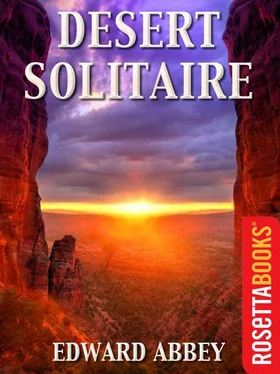Abbey, Edward - Desert Solitaire (Edward Abbey Series )
Здесь есть возможность читать онлайн «Abbey, Edward - Desert Solitaire (Edward Abbey Series )» — ознакомительный отрывок электронной книги совершенно бесплатно, а после прочтения отрывка купить полную версию. В некоторых случаях можно слушать аудио, скачать через торрент в формате fb2 и присутствует краткое содержание. Год выпуска: 2011, Издательство: RosettaBooks, Жанр: Старинная литература, на английском языке. Описание произведения, (предисловие) а так же отзывы посетителей доступны на портале библиотеки ЛибКат.
- Название:Desert Solitaire (Edward Abbey Series )
- Автор:
- Издательство:RosettaBooks
- Жанр:
- Год:2011
- ISBN:нет данных
- Рейтинг книги:4 / 5. Голосов: 1
-
Избранное:Добавить в избранное
- Отзывы:
-
Ваша оценка:
- 80
- 1
- 2
- 3
- 4
- 5
Desert Solitaire (Edward Abbey Series ): краткое содержание, описание и аннотация
Предлагаем к чтению аннотацию, описание, краткое содержание или предисловие (зависит от того, что написал сам автор книги «Desert Solitaire (Edward Abbey Series )»). Если вы не нашли необходимую информацию о книге — напишите в комментариях, мы постараемся отыскать её.
Desert Solitaire (Edward Abbey Series ) — читать онлайн ознакомительный отрывок
Ниже представлен текст книги, разбитый по страницам. Система сохранения места последней прочитанной страницы, позволяет с удобством читать онлайн бесплатно книгу «Desert Solitaire (Edward Abbey Series )», без необходимости каждый раз заново искать на чём Вы остановились. Поставьте закладку, и сможете в любой момент перейти на страницу, на которой закончили чтение.
Интервал:
Закладка:
A man could be a lover and defender of the wilderness without ever in his lifetime leaving the boundaries of asphalt, powerlines, and right-angled surfaces. We need wilderness whether or not we ever set foot in it. We need a refuge even though we may never need to go there. I may never in my life get to Alaska, for example, but I am grateful that it’s there. We need the possibility of escape as surely as we need hope; without it the life of the cities would drive all men into crime or drugs or psychoanalysis.
A familiar and plaintive admonition; I would like to introduce here an entirely new argument in what has now become a stylized debate: the wilderness should be preserved for political reasons. We may need it someday not only as a refuge from excessive industrialism but also as a refuge from authoritarian government, from political oppression. Grand Canyon, Big Bend, Yellowstone and the High Sierras may be required to function as bases for guerrilla warfare against tyranny. What reason have we Americans to think that our own society will necessarily escape the world-wide drift toward the totalitarian organization of men and institutions?
This may seem, at the moment, like a fantastic thesis. Yet history demonstrates that personal liberty is a rare and precious thing, that all societies tend toward the absolute until attack from without or collapse from within breaks up the social machine and makes freedom and innovation again possible. Technology adds a new dimension to the process by providing modern despots with instruments far more efficient than any available to their classical counterparts. Surely it is no accident that the most thorough of tyrannies appeared in Europe’s most thoroughly scientific and industrialized nation. If we allow our own country to become as densely populated, overdeveloped and technically unified as modern Germany we may face a similar fate.
The value of wilderness, on the other hand, as a base for resistance to centralized domination is demonstrated by recent history. In Budapest and Santo Domingo, for example, popular revolts were easily and quickly crushed because an urbanized environment gives the advantage to the power with the technological equipment. But in Cuba, Algeria and Vietnam the revolutionaries, operating in mountain, desert and jungle hinterlands with the active or tacit support of a thinly dispersed population, have been able to overcome or at least fight to a draw official establishment forces equipped with all of the terrible weapons of twentieth century militarism. Rural insurrections can then be suppressed only by bombing and burning villages and countryside so thoroughly that the mass of the population is forced to take refuge in the cities, where the people are then policed and if necessary starved into submission. The city, which should be the symbol and center of civilization, can also be made to function as a concentration camp. This is one of the significant discoveries of contemporary political science.
How does this theory apply to the present and future of the famous United States of North America? Suppose we were planning to impose a dictatorial regime upon the American people—the following preparations would be essential:
1. Concentrate the populace in megalopolitan masses so that they can be kept under close surveillance and where, in case of trouble, they can be bombed, burned, gassed or machine-gunned with a minimum of expense and waste.
2. Mechanize agriculture to the highest degree of refinement, thus forcing most of the scattered farm and ranching population into the cities. Such a policy is desirable because farmers, woodsmen, cowboys, Indians, fishermen and other relatively self-sufficient types are difficult to manage unless displaced from their natural environment.
3. Restrict the possession of firearms to the police and the regular military organizations.
4. Encourage or at least fail to discourage population growth. Large masses of people are more easily manipulated and dominated than scattered individuals.
5. Continue military conscription. Nothing excels military training for creating in young men an attitude of prompt, cheerful obedience to officially constituted authority.
6. Divert attention from deep conflicts within the society by engaging in foreign wars; make support of these wars a test of loyalty, thereby exposing and isolating potential opposition to the new order.
7. Overlay the nation with a finely reticulated network of communications, airlines and interstate autobahns .
8. Raze the wilderness . Dam the rivers, flood the canyons, drain the swamps, log the forests, strip-mine the hills, bulldoze the mountains, irrigate the deserts and improve the national parks into national parking lots.
Idle speculations, feeble and hopeless protest. It was all foreseen nearly half a century ago by the most cold-eyed and clear-eyed of our national poets, on California’s shore, at the end of the open road. Shine, perishing republic.
The sun reigns, I am drowned in light. At this hour, sitting alone at the focal point of the universe, surrounded by a thousand square miles of largely uninhabited no-man’s-land—or all-men’s-land—I cannot seriously be disturbed by any premonitions of danger to my vulnerable wilderness or my all-too-perishable republic. All dangers seem equally remote. In this glare of brilliant emptiness, in this arid intensity of pure heat, in the heart of a weird solitude, great silence and grand desolation, all things recede to distances out of reach, reflecting light but impossible to touch, annihilating all thought and all that men have made to a spasm of whirling dust far out on the golden desert.
The flowers that graced the red dunes in April and May have withered now, all gone to seed except for a few drooping sunflowers. The cliffrose has faded, the yucca stalks have bloomed, blown, died, cracked and dried, the seedpods now only empty husks. Under the daily sweep of the parching May winds almost everything that was green has been burned to soft, sere tones of saffron and auburn. But the summer thunderstorms have not yet begun. When they come, as they soon will, we’ll see a resurgence of hairy green across the land—the succulent scratchy allergenic tumbleweed, that exotic import from the Mongolian steppes.
The majority of living things retreat before the stunning glare and heat of midday. A snake or lizard exposed to the noon sun for more than ten minutes would die; having no internal cooling mechanism the reptiles must at all costs avoid extremes of temperature, especially in the desert where the temperature on the surface of the ground is much higher than it is in the air a few feet above. The snakes therefore seek shade, waiting until sundown to come out to hunt for supper. The insect-eating lizards dart from shelter to shelter, never lingering for more than a few moments in the open blaze.
The other creatures do the same. Like myself, they stay in the shade as much as possible. To conserve bodily moisture and energy the rodents remain in their burrows during the day. Scorpions and spiders go underground for the duration. Deer, antelope, bighorn sheep, bobcats, foxes and coyotes all shade up beneath rock ledges, oakbrush, pinyon and juniper trees, till the sun goes down.
Even the red ants keep to the inside of their evil nests at noon, though they will come spilling out eager to fight if riled with a stick—I’ve tried it, naturally.
Flowers curl up. Leaves fold inward. Everything shrinks, contracts, shrivels; somewhere a desiccated limb on an ancient dying cottonwood tree splits off from the trunk, and the rending fibers make a sound like the shriek of a woman.
The birds are muted, inactive. Now and then I can hear the faraway call of a mourning dove—a call that always sounds far away. A few gray desert sparrows fly from one tree to the next, stop there, do not reappear. The ravens and magpies stay in the shade, the former up on the rimrock, the latter in the trees. The owls, of course, and the nighthawks keep to holes and crevices during the day.
Читать дальшеИнтервал:
Закладка:
Похожие книги на «Desert Solitaire (Edward Abbey Series )»
Представляем Вашему вниманию похожие книги на «Desert Solitaire (Edward Abbey Series )» списком для выбора. Мы отобрали схожую по названию и смыслу литературу в надежде предоставить читателям больше вариантов отыскать новые, интересные, ещё непрочитанные произведения.
Обсуждение, отзывы о книге «Desert Solitaire (Edward Abbey Series )» и просто собственные мнения читателей. Оставьте ваши комментарии, напишите, что Вы думаете о произведении, его смысле или главных героях. Укажите что конкретно понравилось, а что нет, и почему Вы так считаете.












